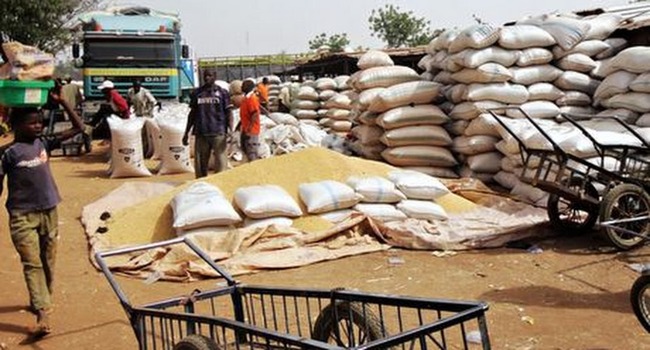Traders in boarder communities lament low patronage following Niger sanctions as retailers woo consumers with promos amid weak demand
The decision by ECOWAS countries to shut down their borders with the Niger Republic has continued to affect businesses in Northern Nigeria.
The impact is now being felt at the Dawanau International Grains Market in Kano State, where cross-border economic trade has boomed for years.
It’s been months since the Niger army took over the mantle of leadership in the country through a coup.
The crisis has since affected social and economic activities within and outside the country.
The impact of sanctions imposed by ECOWAS on Niger has spread to border communities and markets in states that either share a border with Niger or are a few miles away from the junta-led country.
Dawanau International Grains Market has over the years been a major dealer in grains originally established to serve as a major source of grains for Kano and a storage centre for many farm products.
The market has grown to international status, supplying grains and other cash crops to many states in Nigeria and across several countries in West Africa.
The situation here is made grimmer by the sight of dozens of trucks, most of them loaded with food items and other perishable goods, who have remained stranded for weeks.
Ibrahim Usman, a merchant in the market loaded his truck more than fifteen days ago, and his despair has grown daily as he is unable to dispatch his goods to markets beyond the Niger border.
Nigerian authorities are enforcing border restrictions, but the measure has not only impacted on traffic to most of the surrounding Nigerien border communities, but also on truck drivers who are not heading to Niger but to other border towns in Nigeria.
Traders at the Dawanau Market and many others are hopeful that the crisis will end sooner and the normal hustle and bustle of business activities will resume.
Meanwhile, retailers in the Nigerian fast food industry are devising several ways to entice consumers amid weak demand occasioned by surging inflation, which has dampened purchasing power.
Media report shows that some retail outlets have in recent weeks been carrying out trade promotions such as discounts, ‘Buy One, Get One Free’ and free deliveries.
Chicken Republic on Tuesday does a ‘Buy One, Get One Free’ deal that allows customers to purchase its rice and beans meal (N1,350) and get a free meal in selected locations across Nigeria.
It is also offering a 30 percent discount on its ‘citizen meal with spicy rice or fried rice’ and its ‘citizen meal with rice and beans’, which were previously sold for N2,000 and N2,100 respectively.
Mama Cass has a 20 percent discount on its Ofada rice and ‘swallow Combo meal’, which were previously sold for N2,215. The restaurant also discounted the price of its jollof rice combo to N1,400 from N1,750.
Burger King’s ‘Steak King Deal’, which contains a steakhouse burger, a pack of fries and a drink, has been reduced to N4, 500 from N6, 000. It also introduced its ‘budgEat menu’, where a chicken wrap, hamburger, cheeseburger, chicken burger and rodeo burger are sold for N900, N1,100, N1,300, N1,300 and N2,000 respectively.
Cold Stone Creamery is offering free deliveries for two of its ‘Like It’ cups of ice cream sold for N3,500.
“It is basically a reaction to the current realities in the economy. The high inflationary pressures, which are already reducing consumption volumes, are making retailers do direct promotions to drive or increase volumes,” Tola Chukwu, a Lagos-based consumer goods analyst, said.
She said consumers have re-prioritised their spending habits while retailers are looking at how to drive consumption. “Now you are seeing promotions increasing more, not because they have new products but to increase volumes.”
Trade promotions are marketing activities or campaigns conducted by brands to boost sales and profits, expand their customer bases and encourage customers’ loyalty.
They are usually attractive incentives that come in the form of discounts, free products, price protection, and other forms of compensation.
There has been some increasing excitement about trade promotions because retailers are trying to take advantage of their off-peak periods where they don’t have much traffic, said Uchenna Uzo, professor of marketing and faculty director at Lagos Business School.
“They are doing promotions by making use of their idle capacity. So, it is more of a capacity utilisation thing. But there are some promotions that one can run for some time while others must be seasonal and not be the same as their competitors. If not, it will not work,” he added.
An X user, @Morris_Monye, said via his handle: “Where you will know things are bad is when Titus Sardine began adverts.
“I met their sales representative on Wednesday and she told me that sales were very low so they had to start advertising or they would fold up. Cheaper (not so quality) sardine brands were threatening to push them off.”
On May 29, President Bola Tinubu announced the removal of the petrol subsidy, and pump prices have surged to as high as N617 per litre from N184, while the value of the naira has plunged following the floating of the currency in June.
The high cost of dollars and the implementation of a 7.5 percent value added tax on diesel imports have pushed its pump price by about 20 percent to as high as N870 per litre.
The country’s inflation rate quickened for the seventh consecutive month to 24.08 percent in July 2023 from 22.79 percent in June, according to the National Bureau of Statistics.
Inflation pushed an estimated four million more Nigerians into poverty in the first five months of this year, the World Bank said in June.
“In the immediate term, the removal of the petrol subsidy had caused an increase in prices, adversely affecting poor and economically insecure Nigerian households,” it said.
According to Gbolahan Ologunro, portfolio manager at FBNQuest, when consumers experience a persistent increase in food and utilities costs, they tend to cut back on discretionary spending, making businesses in the discretionary space come up with ways of enticing consumers.
“That is why you are seeing a lot of innovations with marketing campaigns. The weak demand has compelled companies to look inwards and devise means of enticing consumers,” he said.
Manufacturers are now adopting coping measures like reducing production capacity and staff strength, lowering costs of power, cutting the number of working hours for non-productive staff and combining procurements, increasing production of smaller quantities of products, divesting to food-related items and agriculture, re-evaluating suppliers and renegotiating contracts with international suppliers to get upfront supplies.




